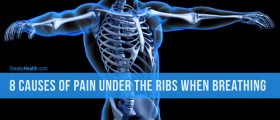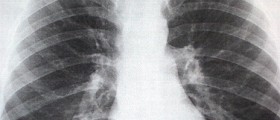I have discovered what appears to be a lump under my rib cage, though it could quite easily be my actual rib which is lumpy.
I used to smoke, although quit about five months ago, and (with the exception of the odd one or two) I have managed to quit pretty much solidly.
It does not hurt when I breathe deeply in or out and the pain is only occasional and seems to be across the right of my rib cage.
My obvious concern is something cancer-related, though it could just as easily be a bump or a muscle strain, I guess.
Anyone suffered the same?
I used to smoke, although quit about five months ago, and (with the exception of the odd one or two) I have managed to quit pretty much solidly.
It does not hurt when I breathe deeply in or out and the pain is only occasional and seems to be across the right of my rib cage.
My obvious concern is something cancer-related, though it could just as easily be a bump or a muscle strain, I guess.
Anyone suffered the same?
Loading...
It is essential that you have this checked by a doctor. Any lump that is found on the body needs to be evaluated. Cancer lumps are rarely painful but this is not something you would want to lean on.
Do you have symptoms like fatigue, appetite loss, weakness, weight loss or pain near the right shoulder blade because these are the symptoms of liver cancer along with the lump on the right side and discomfort on the upper right side.
Now, the weakness and fatigue could be due to many reasons so seeing a doc is a must. Like you said, it could also be a muscle strain or even a cyst
Do you have symptoms like fatigue, appetite loss, weakness, weight loss or pain near the right shoulder blade because these are the symptoms of liver cancer along with the lump on the right side and discomfort on the upper right side.
Now, the weakness and fatigue could be due to many reasons so seeing a doc is a must. Like you said, it could also be a muscle strain or even a cyst
Loading...
Have you gotten any additional info, sounds very similar to my husbands issue, a lump right by his rib on the right side, interminent pain, a smoker. Thanks
Loading...
Have you gotten any additional information re your lump? My husband recently told me about a very similar lump that is occasionally painful but not severe pain right by his rib. Thanks
Loading...
I also suffer from this kind of condition. Mine also is not painful but sends some pain (ish), needle-like sensation sometimes. It is scary and I wonder whether any of you had this x-rayed and how does it look like and what do the doctors say?
Loading...
I too have intimately been affected by this......not me personally but my boyfriend has had a lump on his left side for almost a year now. it started out as just one and it has caused him to have a thing on his side that looks like a huge bruise........only its not. I guess a better term for it would be a dark discoloration of the skin. Now he has probably 3 lumps in his side and im so worried about him because of course i automatically think its gonna be cancer! He has never complained of any pain or discomfort because of it. I would be so happy to take him to the doctor but he has no insurance and we dont have the money to go. Can anyone help me out??? Has anyone experienced anything like this?
Loading...
My husband broke 3 ribs on his lower right ribcage. After they healed he found a lump there. This was about 3 years ago when he broke them, but this lump has gotten bigger, but everytime he looses weight it gets smaller and everytime he gains it gets bigger. We went and go exrays and MRI's but they both turned out fine. Is this something I should be worried about?
Loading...
Man all of u sound exactly like what i am recently goin through jus last night i was laying down and my girlfriend a lump on my top right rib cage. I feel no pain and no strain when i breath. Also its not noticeable when i am standing just when i am laying down or working out i guess it only shows when i put pressure on it or something. My mom thinks it might be from my lyphnotes. Or it might just be from stress.
Loading...
I'm only 13 and I have had this lump now for as long as I have known. And it is starting to get itchy but when I itch it, it hurts soooo bad! I told my mom about it and it's getting bigger so we might go to the doctor. Any suggestions?!
Loading...
sounds like non -hodgekins cancer, which affects younger people, one of the main characteristics aside the lump, is itching, while it's still unlikely, you could get it checked out to be safe as it is getting larger.
Loading...
I have a lump below my right rib cage too, it hurts slightly, but apparently I've had it since I was born.
Maybe I should get it checked.
but I'm kinda worried about what's said here.
"symptoms like fatigue, appetite loss, weakness, weight loss or pain near the right shoulder blade because these are the symptoms of liver cancer along with the lump on the right side and discomfort on the upper right side."
I have been losing a lot of weight and I don't eat enough anymore, also I had some strange sensation in my head the other day, it caused me to collapse and I had a panic attack, which I've never had before.
Also some discoloration on the torso, could this all be related?
Maybe I should get it checked.
but I'm kinda worried about what's said here.
"symptoms like fatigue, appetite loss, weakness, weight loss or pain near the right shoulder blade because these are the symptoms of liver cancer along with the lump on the right side and discomfort on the upper right side."
I have been losing a lot of weight and I don't eat enough anymore, also I had some strange sensation in my head the other day, it caused me to collapse and I had a panic attack, which I've never had before.
Also some discoloration on the torso, could this all be related?
Loading...
Yes, been to doctors and they say it might be muscle sprain. Been to ultrasound and they can't find anything. I'm still feeling this uncomfortable feeling underneath my right rib cage. Been to two doctors and they both says it's nothing or feel nothing. I do feel it and don't know what is it. I'm planning to go to another doctor. It doesn't hurt, it's just you feel a lump there.
Please let me know if you find anything.
Please let me know if you find anything.
Loading...
Hey dude -
Did you just read that a 13-year-old posted this, and decided to freak her out? There are is multitude of things this could be – from severe to minor. You say "sounds like non-Hodgkins cancer," to someone who is young and impressionable, and they could get very anxious. You are clearly not a doctor, or you would know how to spell Hodgkins, so why are you throwing out a suggestion of cancer?
Please be careful in how you word your responses. It would have been better to invert your sentence structure, with your "disclaimer" at the beginning: "It is highly unlikely, but it could be non-Hodgkins cancer."
As for the young poster, looking for medical advice on the internet will only give you anxiety. You and your guardian should make an appointment to see your doctor for a proper evaluation. If you can't afford it, there is probably a health care clinic in your area that is less expensive than a private practice.
Good luck. Sorry to bite your head off, guest poster.
Did you just read that a 13-year-old posted this, and decided to freak her out? There are is multitude of things this could be – from severe to minor. You say "sounds like non-Hodgkins cancer," to someone who is young and impressionable, and they could get very anxious. You are clearly not a doctor, or you would know how to spell Hodgkins, so why are you throwing out a suggestion of cancer?
Please be careful in how you word your responses. It would have been better to invert your sentence structure, with your "disclaimer" at the beginning: "It is highly unlikely, but it could be non-Hodgkins cancer."
As for the young poster, looking for medical advice on the internet will only give you anxiety. You and your guardian should make an appointment to see your doctor for a proper evaluation. If you can't afford it, there is probably a health care clinic in your area that is less expensive than a private practice.
Good luck. Sorry to bite your head off, guest poster.
Loading...
I have been on many forums and web sites, and I have been studying this lump for months now. I also have a lump It is below my right rib cage and it is like a sausage that slants down toward my belly button. If I eat or become to active or get stressed it will get bigger and more shaped like a ball or just a bigger sausage. It fluctuates in size and When I press on it I feel nausea. I have lost about 15-20lbs, and I have constant digestive problems (diarrhea, etc.) Anyways as I said I have been studying this for months now and there are a ton of things it could be...many people say they have got tons of tests/scans done and nothing was found..everyone thinks they are crazy or a hypochondriac...etc. But I may have figured it out..now of course I am not a doctor but this is what I think it may be...Its called Mesenteric Ischemia...I am going to copy and paste information about it to see what you think........There is info from three different sites so be prepared this is a lot of reading for you>>>>>
>>What is mesenteric ischemia?<<
Mesenteric ischemia occurs when the mesenteric arteries (arteries that supply the small and large intestines) become too narrow or blocked to feed adequate amounts of oxygenated blood to the intestines.
Mesenteric ischemia can be chronic or acute.
1. Patients with chronic mesenteric ischemia have had symptoms over a long period of time. Chronic mesenteric ischemia can progress to acute, often very suddenly and without warning.
2. Patients with acute mesenteric ischemia have symptoms that develop abruptly and progress rapidly.
Causes of Mesenteric Ischemia
1. Atherosclerosis (plaque buildup in the arteries) often causes chronic mesenteric ischemia.
2. An embolus (blood clot) that travels to the mesenteric arteries, cutting off the blood supply, can cause acute mesenteric ischemia.
Symptoms of Mesenteric Ischemia
Symptoms include:
1. Sudden, severe abdominal pain after eating
2. Weight loss
3. Digestive problems including diarrhea, nausea, vomiting, flatulence, or constipation
Mesenteric Ischemia Risks
Decreased oxygen can result in death of the intestinal tissue.
More information about mesenteric ischemia is available on the Society for Vascular Surgery website.
----------------------------------------------------------------------------
What is mesenteric ischemia?
The mesenteric arteries are the arteries that supply blood to your large and small intestines. Ischemia occurs when your blood cannot flow through your arteries as well as it should, and your intestines do not receive the necessary oxygen to perform normally. Mesenteric ischemia usually involves the small intestine.
Mesenteric ischemia usually occurs when one or more of your mesenteric arteries narrows or becomes blocked. When this blockage occurs, you can experience severe abdominal pain. Over time, often quickly, the blockage may worsen and cause tissues in your intestine to die because they lack enough blood flow.
Mesenteric ischemia usually occurs in people older than age 60. You may be more likely to experience mesenteric ischemia if you are a smoker or have a high cholesterol level.
Mesenteric ischemia can be either chronic or acute. Chronic means that you have had the condition and symptoms over a relatively long period of time. Acute means that the symptoms start abruptly and become very serious in a short period of time. Chronic mesenteric ischemia can progress without warning to acute mesenteric ischemia, sometimes very quickly.
What are the symptoms?
If you have chronic mesenteric ischemia, you may experience severe pain in your abdomen 15 to 60 minutes after you eat. This pain can occur in any part of the abdomen, but most commonly it occurs in the middle to upper part. The pain may last for as long as 60 to 90 minutes and then disappear. Unfortunately, it tends to return the next time you eat. Many people with chronic mesenteric ischemia begin losing weight because, although they may feel hungry, they do not want to eat because they experience the pain.
Sometimes the symptoms of chronic mesenteric ischemia can be vague and can be similar to those of other conditions. Therefore, your physician will evaluate you and order tests to rule out other problems before making a definite diagnosis. In addition to abdominal pain and weight loss, other symptoms that you might experience include:
* Diarrhea;
* Nausea;
* Vomiting;
* Flatulence; and
* Constipation.
With acute mesenteric ischemia, you may have sudden, severe stomach pain. Narcotic pain medications may not adequately alleviate the pain that is associated with mesenteric ischemia. With acute mesenteric ischemia, you may also experience nausea or vomiting.
What causes mesenteric ischemia?
Atherosclerosis, which slows the amount of blood flowing through your arteries, is a frequent cause of chronic mesenteric ischemia. Your arteries are normally smooth and unobstructed on the inside, but as you age, a sticky substance called plaque forms in the walls of your arteries. Plaque is made of fats and other materials circulating in your blood. As more plaque builds up, your arteries can narrow and stiffen. Eventually, enough plaque builds up to reduce blood flow through your arteries.
A clot, called an embolus, which travels to one of the mesenteric arteries and suddenly blocks the blood flow, is a common cause for acute mesenteric ischemia. These clots often originate in the heart and are more common among patients with an irregular heartbeat or heart disease.
Other conditions that may lead to mesenteric ischemia include:
1. Low blood pressure
2. Congestive heart failure
3. Aortic dissection, which is a tear in the aorta's inner layer;
4. Occlusion or blockage of the veins in the bowel;
5. Coagulation disorders, or
6. Unusual disorders of the blood vessels such as fibromuscular dysplasia and arteritits.
Mesenteric ischemia is a serious condition that may come on and worsen quickly. It is extremely important that you go to your physician or the emergency room if you experience any of the symptoms.
--------------------------------------------------------------------------------------------------
Signs and symptoms
Three progressive phases of ischemic colitis have been described:[5][6]
* A hyper active occurs first, in which the primary symptoms are severe abdominal pain and the passage of bloody stools. Many patients get better and do not progress beyond this phase.
* A paralytic phase can follow if ischemia continues; in this phase, the abdominal pain becomes more widespread, the belly becomes more tender to the touch, and bowel motility decreases, resulting in abdominal bloating, no further bloody stools, and absent bowel sounds on exam.
* Finally, a shock phase can develop as fluids start to leak through the damaged colon lining. This can result in shock and metabolic acidosis with dehydration, low blood pressure, rapid heart rate, and confusion. Patients who progress to this phase are often critically ill and require intensive care.
Symptoms of mesenteric ischemia vary and can be acute (especially if embolic)[7], subacute, or chronic[8].
Case series report prevalence of clinical findings and provide the best available, yet biased, estimate of the sensitivity of clinical findings[9][10]. In a series of 58 patients with mesenteric ischemia due to mixed causes[10]:
* abdominal pain was present in 95% (median of 24 hours duration). The other three patients presented with shock and metabolic acidosis.
* nausea in 44%
* vomiting in 35%
* diarrhea in 35%
* heart rate > 100 in 33%
* 'blood per rectum' in 16% (not stated if this number also included occult blood - presumably not)
* constipation 7%
In the absence of adequate quantitative studies to guide diagnosis, various heuristics help guide diagnosis:
* Mesenteric ischemia "should be suspected when individuals, especially those at high risk for acute mesenteric ischemia, develop severe and persisting abdominal pain that is disproportionate to their abdominal findings"[2]
* Regarding mesenteric arterial thrombosis or embolism: "...early symptoms are present and are relative mild in 50% of cases for three to four days before medical attention is sought"[11].
* Regarding mesenteric arterial thrombosis or embolism: "Any patient with an arrhythmia such as auricular fibrillation who complains of abdominal pain is hghly suspected of having embolization to the superior mesenteric artery until proved otherwise"[11].
* Regarding nonocclusive intestinal ischemia: "Any patient who takes digitalis and diuretics and who complains of abdominal pain must be considered to have nonocclusive ischemia until proved otherwise"[11].
------------------------------------------------------------------------------
The Vascular Web has some pictures you can look at.....My particular lump location and shape makes me think it would be the Superior Mesenteric artery, but my biggest problem is no insurance so if someone finds out what the lump truly is or was for them please post it because no one yet has given and actual answer to what their lump was and there are a lot of us who are having the same problems so please any info you find out...post it...WE NEED SOME DEFINITE ANSWERS...
>>What is mesenteric ischemia?<<
Mesenteric ischemia occurs when the mesenteric arteries (arteries that supply the small and large intestines) become too narrow or blocked to feed adequate amounts of oxygenated blood to the intestines.
Mesenteric ischemia can be chronic or acute.
1. Patients with chronic mesenteric ischemia have had symptoms over a long period of time. Chronic mesenteric ischemia can progress to acute, often very suddenly and without warning.
2. Patients with acute mesenteric ischemia have symptoms that develop abruptly and progress rapidly.
Causes of Mesenteric Ischemia
1. Atherosclerosis (plaque buildup in the arteries) often causes chronic mesenteric ischemia.
2. An embolus (blood clot) that travels to the mesenteric arteries, cutting off the blood supply, can cause acute mesenteric ischemia.
Symptoms of Mesenteric Ischemia
Symptoms include:
1. Sudden, severe abdominal pain after eating
2. Weight loss
3. Digestive problems including diarrhea, nausea, vomiting, flatulence, or constipation
Mesenteric Ischemia Risks
Decreased oxygen can result in death of the intestinal tissue.
More information about mesenteric ischemia is available on the Society for Vascular Surgery website.
----------------------------------------------------------------------------
What is mesenteric ischemia?
The mesenteric arteries are the arteries that supply blood to your large and small intestines. Ischemia occurs when your blood cannot flow through your arteries as well as it should, and your intestines do not receive the necessary oxygen to perform normally. Mesenteric ischemia usually involves the small intestine.
Mesenteric ischemia usually occurs when one or more of your mesenteric arteries narrows or becomes blocked. When this blockage occurs, you can experience severe abdominal pain. Over time, often quickly, the blockage may worsen and cause tissues in your intestine to die because they lack enough blood flow.
Mesenteric ischemia usually occurs in people older than age 60. You may be more likely to experience mesenteric ischemia if you are a smoker or have a high cholesterol level.
Mesenteric ischemia can be either chronic or acute. Chronic means that you have had the condition and symptoms over a relatively long period of time. Acute means that the symptoms start abruptly and become very serious in a short period of time. Chronic mesenteric ischemia can progress without warning to acute mesenteric ischemia, sometimes very quickly.
What are the symptoms?
If you have chronic mesenteric ischemia, you may experience severe pain in your abdomen 15 to 60 minutes after you eat. This pain can occur in any part of the abdomen, but most commonly it occurs in the middle to upper part. The pain may last for as long as 60 to 90 minutes and then disappear. Unfortunately, it tends to return the next time you eat. Many people with chronic mesenteric ischemia begin losing weight because, although they may feel hungry, they do not want to eat because they experience the pain.
Sometimes the symptoms of chronic mesenteric ischemia can be vague and can be similar to those of other conditions. Therefore, your physician will evaluate you and order tests to rule out other problems before making a definite diagnosis. In addition to abdominal pain and weight loss, other symptoms that you might experience include:
* Diarrhea;
* Nausea;
* Vomiting;
* Flatulence; and
* Constipation.
With acute mesenteric ischemia, you may have sudden, severe stomach pain. Narcotic pain medications may not adequately alleviate the pain that is associated with mesenteric ischemia. With acute mesenteric ischemia, you may also experience nausea or vomiting.
What causes mesenteric ischemia?
Atherosclerosis, which slows the amount of blood flowing through your arteries, is a frequent cause of chronic mesenteric ischemia. Your arteries are normally smooth and unobstructed on the inside, but as you age, a sticky substance called plaque forms in the walls of your arteries. Plaque is made of fats and other materials circulating in your blood. As more plaque builds up, your arteries can narrow and stiffen. Eventually, enough plaque builds up to reduce blood flow through your arteries.
A clot, called an embolus, which travels to one of the mesenteric arteries and suddenly blocks the blood flow, is a common cause for acute mesenteric ischemia. These clots often originate in the heart and are more common among patients with an irregular heartbeat or heart disease.
Other conditions that may lead to mesenteric ischemia include:
1. Low blood pressure
2. Congestive heart failure
3. Aortic dissection, which is a tear in the aorta's inner layer;
4. Occlusion or blockage of the veins in the bowel;
5. Coagulation disorders, or
6. Unusual disorders of the blood vessels such as fibromuscular dysplasia and arteritits.
Mesenteric ischemia is a serious condition that may come on and worsen quickly. It is extremely important that you go to your physician or the emergency room if you experience any of the symptoms.
--------------------------------------------------------------------------------------------------
Signs and symptoms
Three progressive phases of ischemic colitis have been described:[5][6]
* A hyper active occurs first, in which the primary symptoms are severe abdominal pain and the passage of bloody stools. Many patients get better and do not progress beyond this phase.
* A paralytic phase can follow if ischemia continues; in this phase, the abdominal pain becomes more widespread, the belly becomes more tender to the touch, and bowel motility decreases, resulting in abdominal bloating, no further bloody stools, and absent bowel sounds on exam.
* Finally, a shock phase can develop as fluids start to leak through the damaged colon lining. This can result in shock and metabolic acidosis with dehydration, low blood pressure, rapid heart rate, and confusion. Patients who progress to this phase are often critically ill and require intensive care.
Symptoms of mesenteric ischemia vary and can be acute (especially if embolic)[7], subacute, or chronic[8].
Case series report prevalence of clinical findings and provide the best available, yet biased, estimate of the sensitivity of clinical findings[9][10]. In a series of 58 patients with mesenteric ischemia due to mixed causes[10]:
* abdominal pain was present in 95% (median of 24 hours duration). The other three patients presented with shock and metabolic acidosis.
* nausea in 44%
* vomiting in 35%
* diarrhea in 35%
* heart rate > 100 in 33%
* 'blood per rectum' in 16% (not stated if this number also included occult blood - presumably not)
* constipation 7%
In the absence of adequate quantitative studies to guide diagnosis, various heuristics help guide diagnosis:
* Mesenteric ischemia "should be suspected when individuals, especially those at high risk for acute mesenteric ischemia, develop severe and persisting abdominal pain that is disproportionate to their abdominal findings"[2]
* Regarding mesenteric arterial thrombosis or embolism: "...early symptoms are present and are relative mild in 50% of cases for three to four days before medical attention is sought"[11].
* Regarding mesenteric arterial thrombosis or embolism: "Any patient with an arrhythmia such as auricular fibrillation who complains of abdominal pain is hghly suspected of having embolization to the superior mesenteric artery until proved otherwise"[11].
* Regarding nonocclusive intestinal ischemia: "Any patient who takes digitalis and diuretics and who complains of abdominal pain must be considered to have nonocclusive ischemia until proved otherwise"[11].
------------------------------------------------------------------------------
The Vascular Web has some pictures you can look at.....My particular lump location and shape makes me think it would be the Superior Mesenteric artery, but my biggest problem is no insurance so if someone finds out what the lump truly is or was for them please post it because no one yet has given and actual answer to what their lump was and there are a lot of us who are having the same problems so please any info you find out...post it...WE NEED SOME DEFINITE ANSWERS...
Loading...
i have also noticed a lump on my rightside just underneath my ribs i think iv had it for 6/7mths now. i am currently 22wks pregnant and i mentioned it to the midwife and she said it hasnt got anything to do with the baby because at 1st i thought it cud b his foot!! it does hurt though sometimes my whloe rightside aches even through to my back. it is also uncomfortable to lye on as it feels like there is something digging into my ribs. also iv noticed that i am getting pins and needles more often in my arms and hands. when u touch it, it seems to b loose and move around it is about a inch big but i am worryed about wot it could be. any suggestions please? :-)
Loading...

















